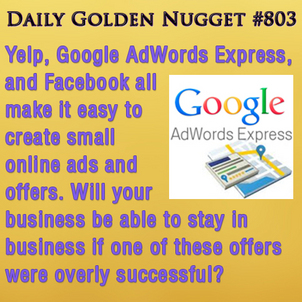 The US economy is coupon and discount crazy and it seems like no one is willing to buy from major retailers unless there are sales to shop or coupons to redeem. JCPenney's business almost collapsed when it instituted Fair and Square pricing in 2012 and which led to its withdrawl in early 2013. They then saved up and planned a big advertising push for the Back to School season, and it seems to be working for them.
The US economy is coupon and discount crazy and it seems like no one is willing to buy from major retailers unless there are sales to shop or coupons to redeem. JCPenney's business almost collapsed when it instituted Fair and Square pricing in 2012 and which led to its withdrawl in early 2013. They then saved up and planned a big advertising push for the Back to School season, and it seems to be working for them.Many retail jewelers don't publicly discount or offer sales of any kind, while others do. It all depends on your business model and how you want your local reputation to be perceived. How does it affect your business if you don't discount, but your competitor does?
There are no shortages of online discounts. Amazon, BlueNile, and millions of other websites built their entire business model around the concept of discounting.
There's big business in couponing and online services like Yelp, Google AdWords Express, and Facebook all offer easy setup methods for you to create coupon offers for your customers. A carefully crafted discount offer placed in one of these paid online services could result in an overwhelming and unmanageable response.
Who wouldn't like to have an overwhelming response their ad? The person who planned poorly, that's who.
In 2012 the San Francisco District Attorney's Consumer Protection Unit reported an increase in the number restaurants, spas, and personal services that offered online discount offers but then struggled to honor them when too many people responded (page 35 of this report).
Ad creation should never be a haphazard activity without specific planning. You can't simply wake up today and decide to create an ad for a discount off all watch repairs. It might seem like a good promotion, but before you launch that promotion you should make sure the entire store is able to handle it, and that it makes financial sense.
First, before you even consider an online discount offer of any type you should know what the average response rate of you previous ads are, you should know what it costs to acquire a customer, and you should know how much your typical customer spends over a 5 year period. If the average cost of your customer acquisition is $75 then any online discount should never provide greater than a $75 savings, otherwise you are getting into trouble.
Let's return to the idea of a discounted watch repair, perhaps a $10 discount through Facebook. How might this help your business? If your average watch repair is $76 then this is a 13% savings for your customers. Instead of saying $10 off, you could state the offer at 13% or 15% off. The 15% offer sounds more impressive than the $10 off, so you might decide to go with that offer instead even though you know some customers will get more than $10 off.
Now let's think about how you handle your repairs, and I'm going to assume that you send all your watches out for repair rather than fixing them in-house. Here are some questions you should be thinking about:
What's the typical turnaround time for watch repairs?
Did you call your watch maker to find out if he is very busy right now?
Is your watch maker going on vacation any time soon?
Are you up to date with paying your watch maker?
Would your watch maker even be able to handle the extra volume if this promotion was successful?
Will you still make a profit on a watch repair if you offer 15% discount?
In this example you have to rely on an outside source to help redeem the promotion, which could lead to trouble as we think about this a little more.
Some jewelers I know take a deposit for all repairs; others don't. Will the 15% off apply to the deposit? If so, then you won't realize a financial benefit from this promotion until after the watch is repaired, returned to you, AND picked up and paid for by the customer. Getting customers back into the store to pick up their repairs is a task in and of itself.
Now, what would happen if you suddenly sent 50 watches to your watch maker? If your watch maker is a solo practitioner, he might need money for parts. If you didn't take deposit money you now have to pull money from somewhere to pay the watch maker in advance.
At this point in this example you (in theory) got 50 people to respond to a Facebook Offer for 15% off a watch repair; but now you are stuck needing to pay your watch maker out of your own pocket in advance for parts because you didn't take any deposit. This promotion could quickly turn into a financial hardship rather than a business boost.
Although you might never run this type of promotion, what I'm attempting to illustrate is that the simple idea and ability to create a Facebook Offer isn't always good unless you think through all the potential factors of meeting the demands that result from it.
As I said above, Yelp, Facebook, and Google AdWords Express make it amazingly easy to sign up and use their online promotion mechanisms. Before you dive into that online marketing arena you need to carefully consider the impact of success on your business.








